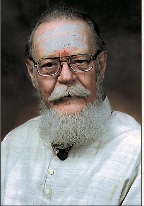By Devananda Tandavan
Are you a man 45 years or older who is finding himself becoming more irritable and argumentative than before? Have you become a procrastinator? Do you feel you are not the “hunk” that you once were whose libido seems to be decreasing as your spouse’s is increasing? Are you more emotional and sentimental these days, frequently responding to situations with tears? Has proving your virility gained a new importance, enough to have you change your style of dress to a more sporty look–no longer donning subdued and drab colors? Have you been tempted to buy a flashy new sportscar recently, perhaps a red Jaguar or Mercedes Benz? Or do you say to yourself, “It is not my fault that I cannot respond intimately anymore. It must be my wife. Maybe I should take on a mistress.” Finally, do you tend to blame others for all of these changes?
If you fit this picture, you may be passing through male menopause, known in the US as andropause and in Europe as viropause. Symptoms during this changing time in life include a definite, although slight, change in physical and mental attitudes toward sex. Usually there is no hormonal cause to explain this midlife crises, as men remain fertile into late life. Normally there is no decrease in the male hormone, testosterone, although a slow abatement may develop, usually after age 65. However, the anxiety that is felt during this period of natural readjustment to life and its demands may not only be traumatic but catastrophic. Since most men take pride in their virility, fitness and physical prowess, it is truly a shock when they discover they are not as agile or adaptive as they once were.
Retirement may become a real problem. If work is no longer there to take up active time, and it has not been replaced with other tasks, life may seem tedious and useless. A man’s self-esteem can be threatened, making him defensive and miserable. He may experience high stress levels for the first time in his life, which may result in complications, such as alcohol abuse or perhaps even drugs.
Primarily andropause occurs among white-collar men who have high goals, perhaps higher than their life’s achievements. Frequent thoughts of getting old and fears of death, loss of confidence during intimacy, retirement and of being fired from his job can amplify the stress. If that weren’t enough, psychological changes can provoke a fear of losing physical and mental stability.
The more a man is “me” oriented, the more likely he is to have symptoms of andropause. It is far more common in the West than in calmer Oriental cultures; however, this is changing as the East becomes more Westernized. Not all men pass through this andropause, and it is possible to prevent the occurrence altogether by consciously adopting more realistic goals. Treatment of andropause is primarily psychological and philosophical. Controversial hormone replacement therapy is not recommended. Simply recognizing and understanding it as a syndrome may in itself decrease the severity of symptoms. Male menopause is very real and can be serious, but adhering to a dharmic path can aid in diminishing or even bypassing the experience.
Dr. Tandavan, 76, retired nuclear physician and hospital staff president, lives in Chicago, where he specializes in alternative healing arts. Visit his home page at the Hinduism Today Website.
